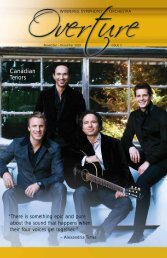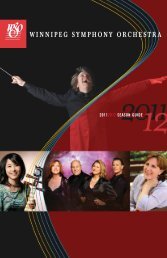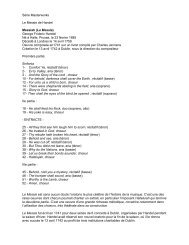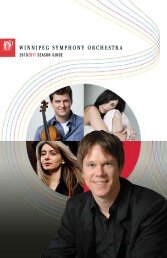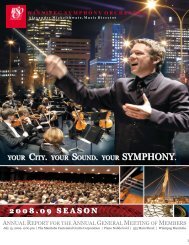Issue 1: September – October - Winnipeg Symphony Orchestra
Issue 1: September – October - Winnipeg Symphony Orchestra
Issue 1: September – October - Winnipeg Symphony Orchestra
You also want an ePaper? Increase the reach of your titles
YUMPU automatically turns print PDFs into web optimized ePapers that Google loves.
PROGRAM NOTES<br />
by James Manishen<br />
Wa Wa Tey Wak<br />
(Northern Lights)<br />
Andrew Balfour<br />
b. Fisher Branch Reserve, MB /<br />
1967<br />
Composed: 2006<br />
First performance: March 11, 2006<br />
by Camerata Nova<br />
First WSO performance<br />
Wa Wa Tey Wak is based on a<br />
modern legend about a young<br />
girl that lived 300 years ago in<br />
what we now call Canada. She is<br />
transported to modern times by<br />
a sorcerer and wanders the<br />
streets of <strong>Winnipeg</strong>. No one<br />
can see her except the street<br />
people, the “lost tribe.”<br />
Of Cree descent, composer<br />
Andrew Balfour describes the work<br />
as “about transformation - a<br />
journey…sad things...social<br />
issues…all redeemed by the<br />
Northern Lights. It’s one of the<br />
worst tragedies of our country: so<br />
much wealth, so much prosperity<br />
and so much poverty at the same<br />
time. That’s why I wrote this piece,<br />
because I felt I had something to<br />
say since I have also lived in<br />
poverty but redeemed by music, I<br />
guess you could say.”<br />
Concerto for Pipa with<br />
String <strong>Orchestra</strong><br />
Lou Harrison<br />
b. Portland, OR / May 14, 1917<br />
d. Lafayette, IN / February 2, 2003<br />
Composed: 1997<br />
First performance: April 26, 1997,<br />
Stuttgart Chamber <strong>Orchestra</strong>,<br />
Dennis Russell Davies conducting<br />
with Wu Man as soloist<br />
First WSO performance<br />
By his own admission,<br />
the music of West<br />
Coast-born Lou<br />
Harrison is “a song<br />
and a dance,” an<br />
influence from<br />
14 OVERTURE I <strong>September</strong> <strong>–</strong> <strong>October</strong> 2011<br />
Harrison’s mentor, American<br />
pioneer composer Henry Cowell,<br />
who taught Harrison that music<br />
around the world is mainly melody<br />
with a rhythmic accompaniment.<br />
Long interested in music from<br />
cultures bordering the Pacific,<br />
Cowell inspired Harrison to dig<br />
into world music in general, yet<br />
within an individual compositional<br />
style of no less importance. “Don’t<br />
put hybrids down,” Harrison once<br />
told a BBC interviewer. “There<br />
isn’t anything else.”<br />
Harrison built instruments out of<br />
everyday items, began working<br />
with John Cage and eventually<br />
studied briefly with Arnold<br />
Schoenberg in Los Angeles. In<br />
1961, Harrison went to Tokyo<br />
where, for two years, he immersed<br />
himself in the study of Korean and<br />
Chinese classical music. In the<br />
early 1970s, his fusion of Eastern<br />
and Western style began to<br />
crystallize. The pipa concerto is<br />
Harrison’s last large-scale work.<br />
The motoric theme of the first<br />
movement suggests a classical<br />
concerto coming, though with<br />
Chinese tang as the pipa is joined<br />
by solo violin. The second<br />
movement is a suite that treats the<br />
pipa in various guises: a pseudo<br />
balalaika in the Troika, a<br />
percussion instrument in Three<br />
Sharing, and a mandolin in<br />
Neapolitan. The elegiac third<br />
movement’s long lines pave the<br />
way for the finale entitled<br />
Estampie, a dancelike form from<br />
14th century France and Italy.<br />
We are honoured to be joined<br />
tonight by Wu Man, the dedicatee<br />
of Lou Harrison’s Pipa Concerto.<br />
La Noche de los Mayas<br />
Silvestre Revueltas<br />
b. Santiago, Papasquiaro, Durango /<br />
December 31, 1899<br />
d. Mexico City / <strong>October</strong> 5, 1940<br />
Composed: 1939<br />
Last WSO performance: 2008,<br />
Alexander Mickelthwate, conductor<br />
“I prefer the music of<br />
the people of the<br />
ranchos and villages of<br />
my country,” Silvestre<br />
Revueltas once said<br />
when asked about his<br />
tastes in music. Central to his<br />
music are the tang of Mexico, the<br />
spirit of its people and his own<br />
experiences during the volatile<br />
period following his appointment<br />
as assistant to Carlos Chávez and<br />
the newly formed Orquesta<br />
Sinfónica de México in 1929<br />
following a three-year period in<br />
the United States where he<br />
worked as a theatre violinist and<br />
conductor. During this time,<br />
Revueltas also became active in the<br />
cause of artists' and workers'<br />
rights.<br />
In 1937, Revueltas was sent to<br />
Spain to direct concerts in support<br />
of Mexican Loyalist causes but<br />
returned poor and in broken<br />
health. He died of alcoholism,<br />
heartbroken over the death of his<br />
two daughters.<br />
La Noche de los Mayas (“The Night<br />
of the Mayas”) was composed as a<br />
score to the film of the same name<br />
directed by Chano Urueta with<br />
script by Antonio Médiz Bolio. A<br />
four-movement suite was created<br />
in 1960 by Mexican conductor<br />
José Limantour. The opening<br />
movement’s huge cry from the<br />
orchestra suggests Revueltas’s<br />
political angst, tempered by the<br />
central section, which is warm and<br />
reflective. Noche de Jaranas is a<br />
fiery dance movement punctuated<br />
with cross rhythms. The solo flute<br />
and drum in Noche de Yucatan<br />
quote a traditional native folk<br />
melody (“Come on boys, the sun is<br />
about to set”). The closing<br />
movement is a riot of percussion,<br />
culminating with the orchestral<br />
outburst that opened the work.<br />
Vous adresser au service des abonnés ou consulter le site www.wso.ca pour la traduction en français.



